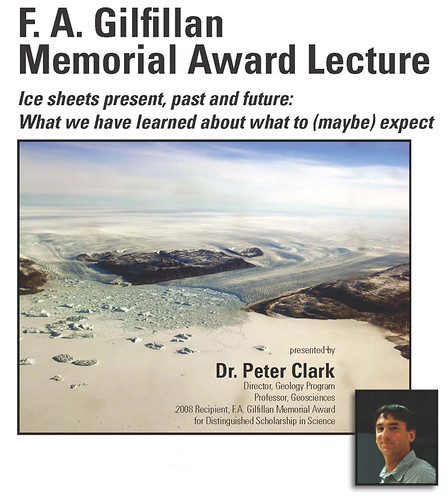 Date: May 4, 2009
Date: May 4, 2009
Austin Auditorium, LaSells Stewart Conference Center
Welcome: 7:15-7:30 p.m.
Introducing Dr. Peter Clark
Dr. Sherman H. Bloomer, Dean, College of Science
Lecture, Q&A: 7:30-8:30 p.m.
About Dr. Peter Clark:
Dr. Peter Clark earned a BS from St. Lawrence University, an MS from the University of Waterloo, and, in 1984, a Ph.D. from the University of Colorado. He worked as an assistant professor at the University of Illinois-Chicago before coming to OSU in 1988. Dr. Clark has pursued wide ranging studies with students and collaborators, including controls on global sea level change, the history of northern hemisphere ice sheets, the role of ice sheets in global climate change, and mechanics of large scale glacial movement and sediment deposition. Deciphering mechanisms of abrupt climate change is a major focus of his work – integrating theoretical studies, field observations, and lab work. He has published over 100 peer-reviewed articles, has edited three influential books, and has been continuously funded by the NSF since 1987.
Dr. Clark’s work has been recognized with the 2007 Easterbrook Award from the Geological Society of America and the 1997 Gladys Cole Memorial Research Award, also from the GSA. He has played a major leadership role in his discipline, work that includes organizing a Chapman Conference and international conferences on ice sheets, an invitation to be a keynote speaker to the Geological Society of London, service as an editor and on editorial boards of four major geological journals, and significant roles in the leadership of the GSA, and most recently as a lead author for the US Climate Change Science Program on Abrupt Climate Change.
Dr. Clark has been a consistent and committed contributor to education in his department. A baccalaureate core course he developed on Global Change and Earth Science remains a popular part of the Synthesis requirement; he has contributed to numerous required majors courses in geology and a diversity of graduate courses in stratigraphy, glacial geology, and geochronology. His Ph.D. students have gone on to post-doctoral positions at Woods Hole Oceanographic Institution, Columbia University, University of British Columbia, and Oxford University, and faculty appointments at the University of New Hampshire, the University of Wisconsin at Madison, the University of Quebec at Montreal, and the University of St. Andrews. He has also been serving as program director for geology for some time, and is one of the directors of the PALEOVAR initiative, a multi-year, multi-institution program in climate change studies funded by the National Science Foundation.
About the F.A. Gilfillan Memorial Award for Distinguished Scholarship in Science:
A true Renaissance man, Francois A. “Doc” Gilfillan inspired colleagues and students alike. He served the College of Science as dean from 1938 to 1962, and OSU as acting president from 1941 to 1942. Doc Gilfillan dedicated his professional life to scholarship and science at OSU as a faculty member in pharmaceutical chemistry.
During his administration as dean, the College gained stature because of his work to establish many new programs in research and education. He was fluent in German, Russian, French, and Italian; studied Latin, Greek, and Japanese; and knew ancient Sumerian and a few NW Indian dialects. His love of learning led him to explore new knowledge all his life.
In his memory, his family established the F.A. Gilfillan Memorial Award for Distinguished Scholarship in Science. The purpose of the award is to recognize distinguished scholarship in science by honoring a faculty member in the College whose scholarship and scientific accomplishments extend over a substantial period of time at OSU and are widely recognized by peers. The winner of the award receives a plaque presented at the annual College of Science Faculty and Staff Awards Day, a stipend, and an opportunity to present their research in a public lecture.


